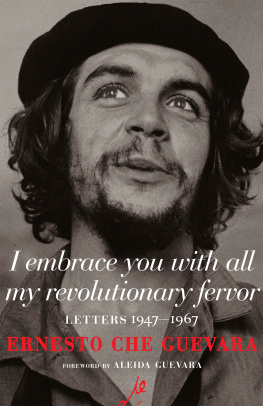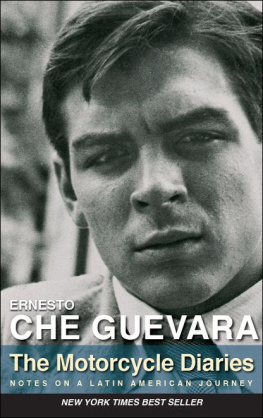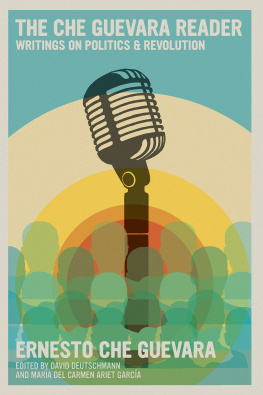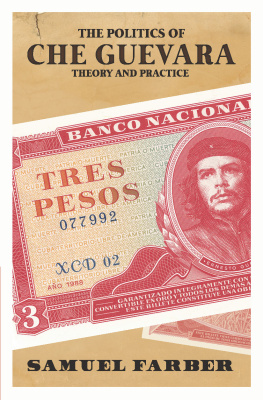Published by Seven Stories Press on behalf of Ocean Press, Melbourne, Australia, and the Che Guevara Studies Center, Havana. Direct all rights inquiries and permissions questions to .
All rights reserved. No part of this publication may be reproduced, stored in a retrieval system or transmitted in any form or by any means, electronic, mechanical, photocopying, recording or otherwise, without the prior permission of the publisher.
Library of Congress Cataloging-in-Publication Data has been applied for.
ISBN: 978-1-64421-095-6 (hardcover)
ISBN 978-1-64421-096-3 (e-book)
Reading my fathers letters
Aleida Guevara
This book is a real gem in the collaborative publishing project between the Che Guevara Studies Center (Havana) and Ocean Press and Ocean Sur. As a selection of his letters, it reveals the intimate side of the man my father was. We often might not know a person very well, but when we read their letters we learn who they really are. And this is what makes this book very special for me because they are letters from different periods of his life and show the development of a real person, the evolution of a human being.
In preparing a speech, Che would carefully weigh his words and plan what he was going to say. He was usually quite animated when giving a speech, clearly presenting his thoughts. In his letters to family and friends, however, he reveals himself candidly,spontaneously. So reading my fathers letters is a fascinating way to really get to know him. The Cuban writer Miguel Barnet recently commented what a shame it is that we no longer write letters. And its true. All you receive these days is an e-mail or a message on your cell phone. Hand-written letters are a lost art, which is a pity because, as you read this book, you can witness how a young person changes over time.
The initial selection of letters are from his youth, when Ernesto leaves Argentina for the first time. In a letter to his mother, whom he playfully calls Vieja or Old Lady, he writes:
I am certain of two things: first is that if I reach my truly creative phase at about 35, my exclusive, or at least main, concern will be nuclear physics, or genetics, or some other field that brings together the most interesting aspects of knowledge. The second is that the Americas will be the theater of my adventures in a way that is much more significant than I could have imagined. I think I have really come to understand it and I feel [Latin] American, which means having a character distinct from all other peoples on the earth. Naturally, Ill visit the rest of the world.
Starting out as a carefree traveler and ambitious scientific researcher, he writes to his mother that his worldview is becoming much sharper after witnessing first hand the 1954 US-backed overthrow of the democratically elected government of Guatemala:
The way that the gringos treat Latin America (remember that the gringos are Yankees) was making me feel increasingly indignant, but at the same time I studied the reasons for their actions and found a scientific explanation. Then came Guatemala and everything that is difficult to describe.
On the birth of his first child, Hilda, in February 1956, he writes addressing his mother as Abuelita [Granny]:
Both of us are a bit older, or if you consider yourself a fruit, a bit more mature. The baby is rather ugly, but you only have to look at her to realize that she is different from all other children of her age. Although she cries when she is hungry, pees herself frequently, light bothers her and she sleeps most of the time, there is something that immediately differentiates her from every other baby: her papa is called Ernesto Guevara.
Thats my father!
Another of the most interesting letters in this book is one Che wrote as a leader of the revolutionary government to the director of the Cuban magazine Bohemia in May 1959, responding to personal criticisms made against him as a foreigner and outsider in Cuba:
It is not my intention to defend myself against the fallacious imputations and the insidious reference to my Argentine citizenship. I am Argentine and I shall never renounce my country of origin (if you will excuse my audacity in the comparison, neither did [Cuban independence hero] Mximo Gmez renounce his Dominican homeland). But I feel Cuban, independently of whether the laws certify it or not: as a Cuban, I shared the sacrifices of the people throughout the armed struggle and today I share their hopes of bringing them to fruition.
There are many letters here that I am sure the reader will enjoy, including some sent to my mother during his travels abroad representing the Cuban revolutionary government, such as this one written only weeks after my parents were married in 1959:
They decorated me with the Order of the Republic [in Egypt]. Avery big medal that looks great on me, and not just because I say so. I went to the silver market to buy you a bracelet but I didnt see anything resembling what I wanted for you, although I am bringing you a few other little things. So far the trip has gone very fast; we havent had much of a chance to see anything, and it was the same in the UAR [United Arab Republic]. Im sleeping very little and my eyelids are starting to stick together.
The following day the Cuban delegation visited Gaza and they were horrified at the conditions endured by the Palestinians living there.
I went to visit the Brazilian officials who are looking after those areas. I established new diplomatic norms of confraternity between peoples by falling asleep on the shoulder of the Egyptian official who was accompanying me.
He wrote some other delightful letters to my mother. I love this little fragment:
I cant write much because time is short. I only want to tell you that I bought you a beautiful kimono that has a special enchantment for me because of the enchanting geisha who modeled it.
You see, my mother is the jealous type.
There is a special letter written to Ernesto Sbato, an Argentine writer, in which Che explains the process of the Cuban revolution and how he saw Fidels role. Che describes Fidel as steadfast, always on the frontline and someone who was always honest about what he was going to do. The United States government, Che comments to his fellow Argentine, had its own expectations of Latin American political leaders and Fidels honesty confused them. To them, what the Cuban government said about the agrarian reform, for example, meant that it would not carry out the agrarian reform if they gave Cuba sufficient money. So when the revolutionary government did what it said it would do, the US government genuinely believed the Cubans had lied. It could never understand that the revolutionary leaders were being truthful.
My fathers sense of humor is evident in many letters, such as the one written to Dr. Eduardo Ordaz, who was responsible for publishing 6,300 copies of a journal on psychiatry in Cuba. Che writes he is on the verge of neuro-economic psychosis because he thinks that 3,000 too many copies have been printed, given that there were only about 3,000 doctors in Cuba at the time:







